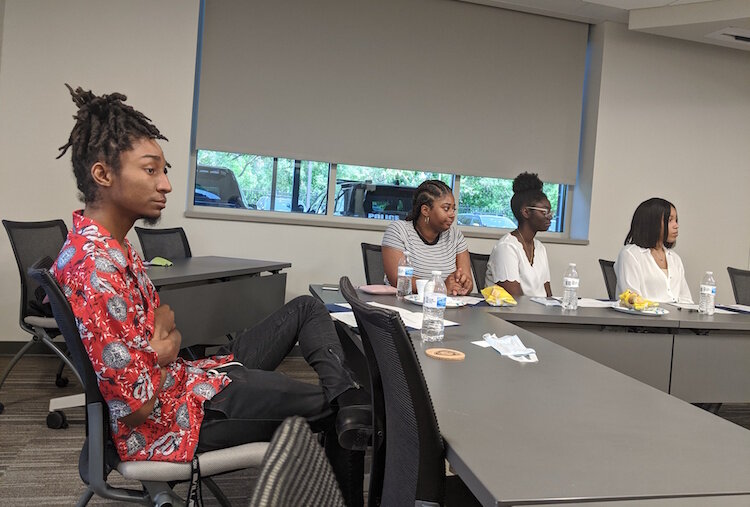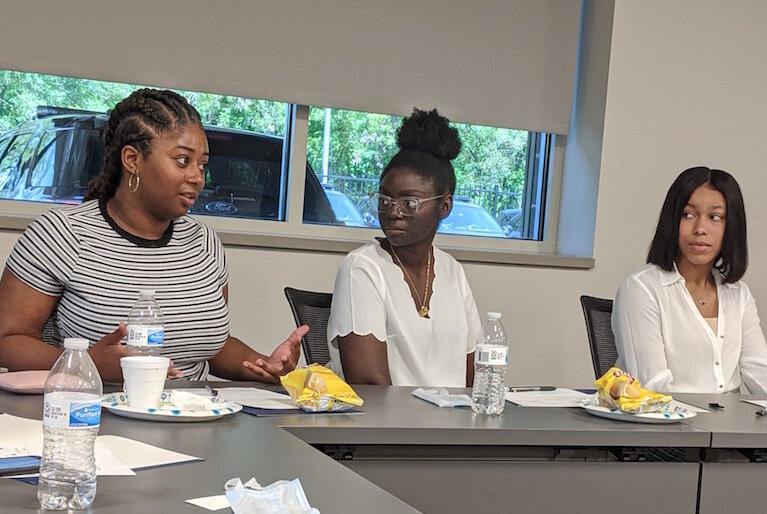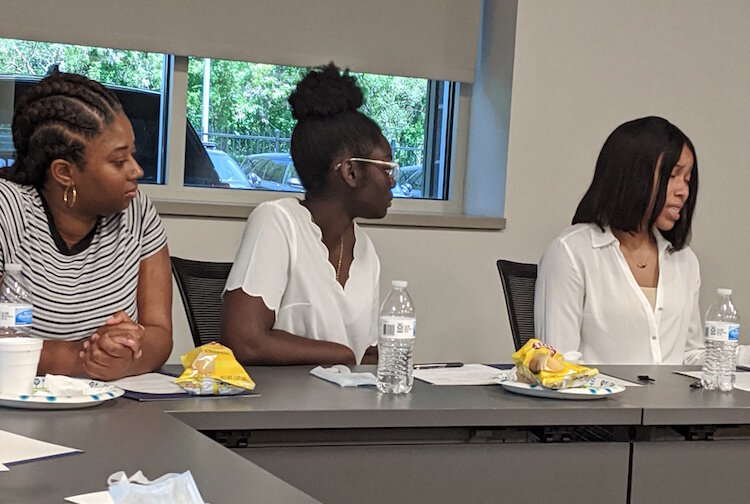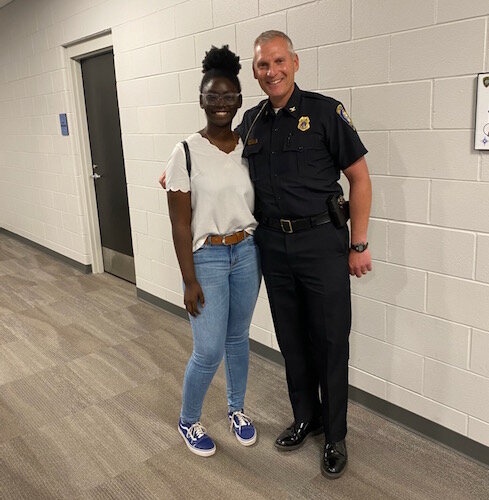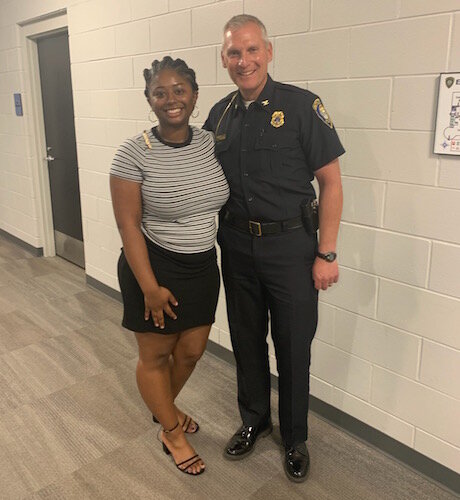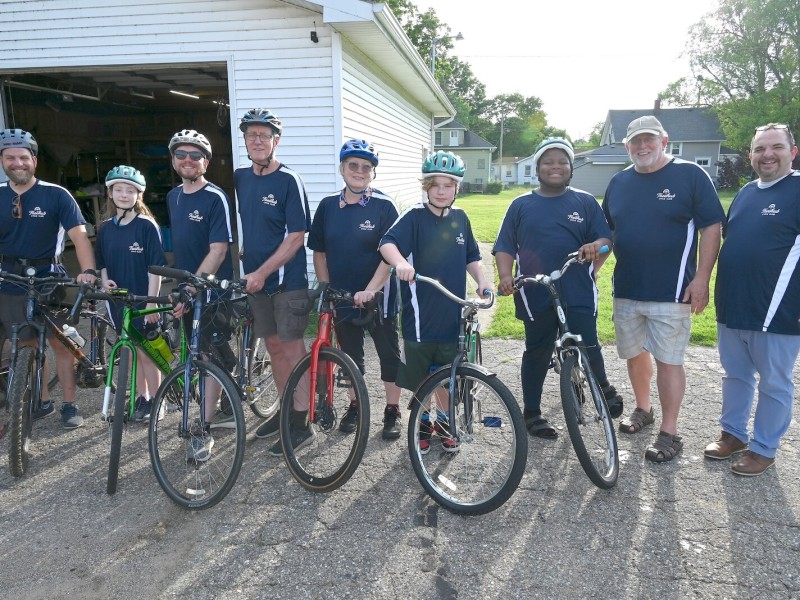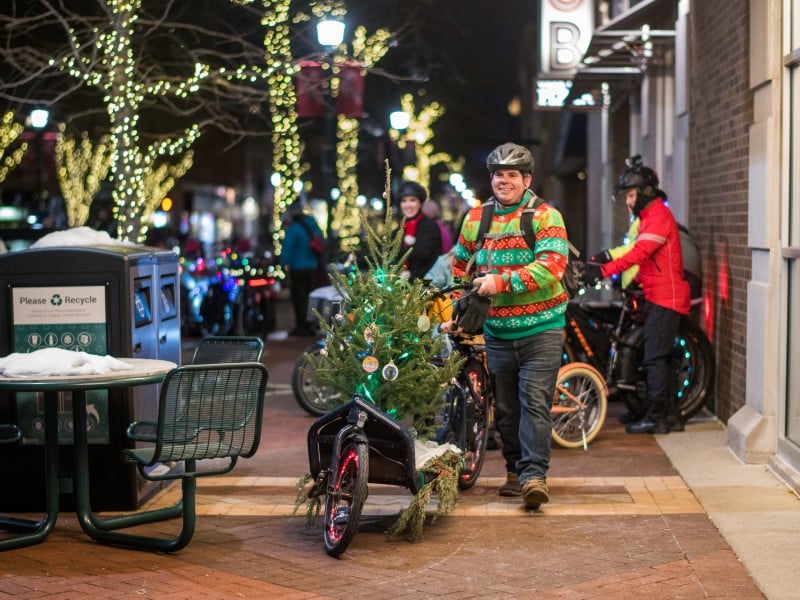Young people and Battle Creek Police talk about ways to improve relationships
In meeting with young adults, police encouraged to be more present in the community, but financial realities may prohibit such relationship-building moves in Battle Creek.
Better relationships between residents and officers with the Battle Creek Police Department could be established with something as simple as a tip-off – not the kind that involves reporting possible criminal activity.
This tip-off would be the kind that takes place on a basketball court with bragging rights thrown in, between the city’s young people and BCPD officers.
This was one of several ideas discussed on Wednesday, June 17, during a three-hour meeting that involved about eight young people and four members of the BCPD, including Chief Jim Blocker. James McGee, a counselor at Northwestern Elementary, pushed the idea throughout the meeting of officers showing up and being present at community events and gatherings and “actually being a part of it versus just being there. You could also invite People of Color to your community events,” he says.
Blocker says for years his department has either been implementing or seeking funding opportunities to implement and attend as many community events as they can. He says ongoing and increasing budget constraints being faced by his department have not helped those efforts.
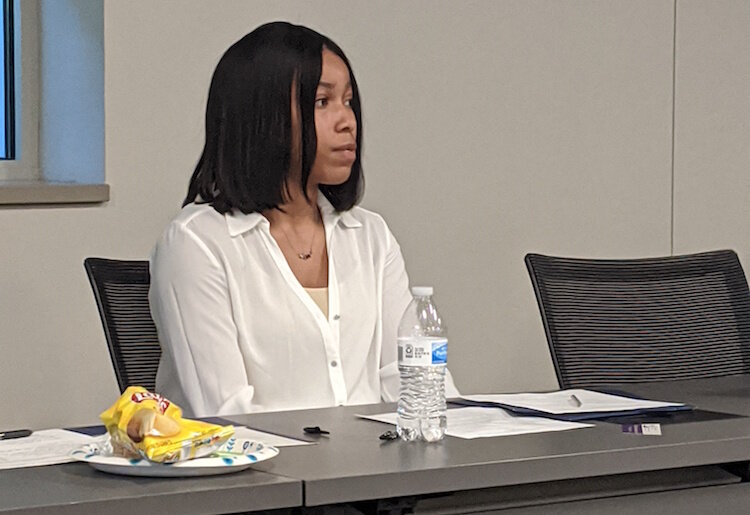
McGee acknowledged that not everyone may be happy to see officers, but there are those who would and that is a place to start building a relationship that goes beyond stereotypes and pre-conceived notions on both sides.
The meeting was requested by Jenasia Morris, an African American resident, who said she could no longer sit back and do nothing after the murder of George Floyd in late May in Minneapolis.
Morris, a student at Kellogg Community College and a candidate for the Battle Creek City Commission, came prepared with folders containing a sheet of paper listing general concerns; specific areas of concern; potential policies; and long-term goals which she distributed to those at the meeting.
“The reason we’re here today is because we want to lay out a foundation of how we expected to be treated and what you guys expect when you come into contact with us,” Morris says. “There’s a lot of uncertainty out there and we want to eliminate the fear that people are feeling.”
This fear becomes apparent in numerous situations. Among the most-often mentioned during the meeting is when a person of color is pulled over by an officer for a traffic stop.
Morris says she, like the majority of African American youth, was taught at a young age what to do if they are stopped by police. This advice includes announcing to an officer exactly what you’re going to do and why you’re doing it. However, she says it’s been her experience that some officers become irritated when people do this.
“If I get pulled over and I announce that I’m going to reach into the glove compartment to get my ID, sometimes cops get offended when people announce what they’re going to do,” Morris says.
“This is what my mother taught me to do when I was still in elementary school.”
Under her prepared Specific Areas of Concern, Morris said: “We realize you are scared – we are scared too! Don’t be offended if I announce my actions. Assess the situation and act accordingly – don’t come in with a preconceived notion.”
Recognizing underlying issues
Damon Young, a Corporal with the BCPD and a School Resource Officer at Battle Creek Central High School, says officers can get ornery if the individual is saying things in a way that comes off as being sarcastic. He says this can lead to frustration on both sides.
“When people are scared in situations, they do unpredictable things,” Young says, but ultimately it is up to the officer to manage the situation so that it doesn’t escalate.
BCPD Detective Tyler Sutherland says more often than not, the way an individual interacts with an officer has a lot to do with past experience with the police. For example, the last five experiences may have been negative for both the police, who may have come into contact with someone who wanted to fight with them or spit on them, and for the individual, who may have previously dealt with an officer who didn’t treat them with respect and professionalism.
“You can be on your guard and learn from past experiences,” Sutherland says, “and know that you don’t have to act the same way that you did in those past five encounters. Officers are trained to realize that you’ve got to treat every encounter or person as if it’s a clean slate. Fear of this officer and that he or she may hurt me is a real thing because you see so much about that on social media and in the news.”
McGee says that everybody owes each other respect, but officers have to recognize that they don’t know what kind of baggage someone has or what their previous encounters have been like with the police.
“You’re supposed to protect me, you are the ‘overseer’ at that point. You’re supposed to give me comfort and safety and even if I’m being a jackass that doesn’t give you the right to treat me badly,” McGee says. “The citizens are not you guys, we don’t all tote guns. All we have is the Internet and when we have these terrible encounters with police and ordinary people, it creates distrust.”
McGee says officers need to consider things such as was the person a victim of bullying in school or did they encounter slight past aggressions in the way they were treated because they are a person of color. He says officers have to step above that and understand that it’s their job to protect and serve all people.
“If you want that person you’re dealing with to be the bigger person, the same should apply to police officers because there’s that power difference. This is especially true for people who haven’t had that power or privilege,” says Khyrinn Herring, who works for the Southwest Michigan Urban League and with the Battle Creek Coalition for Truth Racial Healing and Transformation. “You chose that job and you have to take what comes with it.”
Young, who was the victim of police brutality when he was 17-years-old says for a period of two years after that he hated all police, an irony since his father was a police officer.
“You have to step back and realize you were at some point impacted because of what you went through,” Young says. “It’s important that not only me but officers, in general, try to understand that.”
Calling out bad behavior
Many times a bad experience with an officer is never reported as was the case with an incident involving Morris. Last summer she was driving home from her boyfriend’s home at about 11 p.m. when she was pulled over by a police officer who wanted to know where she was going. After leaving her boyfriend, she was trying to decide if she wanted to stop to get something to eat or go straight home.
“I was right downtown by the Kool Center and decided to turn left on Washington and head home and that’s when I was stopped. The officer literally asked me where I was going,” Morris says. “It was late at night and I was in the car by myself. I felt like I was being singled out.”
She did what her mother has instructed her and her three siblings to do – answer the officer’s questions and remain calm.
When asked if she followed up with anyone at the police department about being stopped, she says, “I didn’t follow up because I felt like nothing was going to come of it.”
Blocker says this is one of the challenges faced by his department. When people don’t report an experience like the one Morris had, he says the opportunity to make it right is lost.
“We leap at those opportunities to take a look at these incidences. We have many examples of when someone brought a situation to our attention,” Blocker says. “Then we work really hard to get the officer and the person back together to talk it through.”
Early on in his career Blocker says he learned a valuable lesson about what can happen when an officer and a citizen calling for help don’t take the time to listen and understand.
During his shift, he had responded to multiple traumatic events and then he answered a call for service from a woman. He admitted that the previous call he had been on left him short-tempered and irritable, which spilled over into his interaction with the woman calling the police department.
“Her call for help was important to her,” Blocker says. “Those are the moments we fail and absolutely lose one another. The best lessons I learned didn’t come from the Police Academy, they came through working on the road and listening to people.”
Resources vs. disciplinarians
Sanye Sichinga, a rising sophomore at Howard University from Battle Creek, says she would like to see police officers viewed as resources rather than disciplinarians.
“Everyone understands that a police officer is human, but it’s important when they have on that uniform that they’re looked at as a member of the community,” she says. “It’s important when we see that uniform to not have to associate that with being a disciplinarian or that something bad is about to happen.”
Will Gensch, a Sergeant with the BCPD, says sometimes officers are put in that situation by other people. He says he was called to a large birthday party at Post Park that he had to close down.
“I told one of the adults that he had to break up the party,” Gensch says. “He had me explain to the 7-year-old who the party was for and that instantly put me in the position of being the bad guy.”
In that particular case, he says, “The message that was being portrayed to the younger kids is ‘here’s a police officer and he’s a bad guy’.”
“We as a community on both sides need to work together to eliminate bias,” Morris says. “I got to know Young as a person and I realized he is a good resource for Battle Creek Central, but a lot of kids don’t understand that. We need to start promoting police as resources and not just who you call when someone’s being bad.”
Herring says she thinks the image of the police department would benefit from having officers dress more casually, especially when they are attending community events. During a recent peaceful protest to honor George Floyd, she says the officers she saw were in casual clothes which made them seem more like “another person supporting the cause.
“When police show up in tactical gear, all eyes go to them because they have everything on them and their badge,” Herring says. “The police officers at Lakeview High School always had on casual outfits and they were loved and respected, often more than the teachers. They were there for every pep rally. They were representing the police force, but they were also actively engaging with us.”
Young agrees that it’s important to be at community events, but he says that their presence isn’t always welcomed, even if they’re in plainclothes.
“It’s almost like ‘why is that cop here who’s always got his badge and gun on me?’” Young says. “I am a police officer showing up as a citizen, but it still puts people on edge because they don’t know or understand that I’m really not there as a police officer. There have been a couple of events that I’ve left because I made people uncomfortable.”
Despite this, McGee says, “I implore you to overlook that and just show up.”
Sichinga says, “We can’t expect people to change their minds about the police presence if they haven’t experienced you in a different light. It’s important to foster relationships so we know how our police department is going to act.”
Morris says she thinks the BCPD is more “accepting of us” than other neighboring departments.
“It’s tough to hear that ‘accepting of us’. We are all ‘us.’” Blocker says.
Reality and expectation
Blocker and the other officers at the meeting say they would like to be able to attend more community events and play a game of pick-up basketball with residents, but they have financial realities that they can’t ignore.
Twenty-five years ago the BCPD had 148 officers.
“Today we’ve got 102 and by the end of the summer we could be down to 99 because of COVID19 and its impact on our budget,” Blocker says. “The reality of our budget is that it’s been depleted for the last 94 years.
“It’s so tough right now. We average 670 calls for service a week on one shift. The calls to 911 don’t stop. We want you to see our hearts and minds but that opportunity is dwindling. We want you as future leaders to understand what we face. This may sound like an excuse, but it’s the reality.”
Sutherland says when an officer attends a community event or fulfills a request to make a presentation to a group or volunteers for an activity or event, the department has to find someone to take his or her place on patrol.
“The moment you move one of us out of one assignment to go to another, someone has to fill that spot and we usually have to pay extra to fill that hole,” Sutherland says. “The choice becomes ‘Do we let that hole be there and let the citizens of that neighborhood not get police coverage that day?’”
McGee says he thinks being present and engaged will go a long way. Blocker says he thinks it also will help to have people who have had positive experiences with his officers, share that with others.
But, Herring says, “Your actions will speak louder than our words ever could.”
Following a more wide-ranging discussion that included the use of deadly force, how officers are disciplined, and the implementation of the 8CantWait campaign, Morris and Blocker agreed to meet again to keep the conversation going and identify more common ground.
“This is a start,” Morris says. “But, there is a lot more work to be done.”

